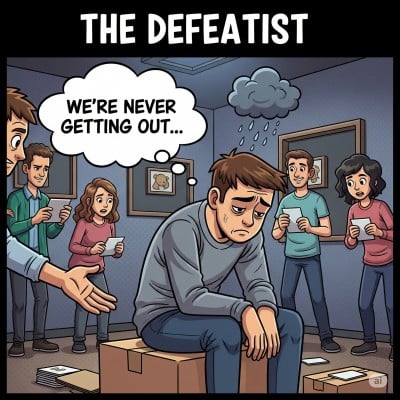Among the many personas that emerge in the high-pressure environment of escape rooms, few are as misunderstood as the Defeatist. Unlike the Adrenaline Junkie who thrives on energy, or the Explorer who hunts down hidden details, the Defeatist is often characterized by doubt 😞 🧩, resignation, and an inclination to give up when obstacles feel too daunting. At first glance, this persona may appear to hinder the team, dragging morale down and contributing little to the overall effort 🔥. Yet, when we look deeper, the Defeatist reveals an important and even transformative role within the group dynamic.
The Defeatist embodies one of the greatest challenges of any escape room: perseverance in the face of setbacks ⏳ 🔐. Escape rooms are designed to test resilience as much as they test intelligence. Locks won’t open, puzzles mislead, and the clock ticks down relentlessly, creating the illusion that success is slipping further away. In such moments, frustration and doubt naturally creep in 🕰 ️. The Defeatist simply externalizes what many participants may feel internally the fear that the team might not succeed. By voicing these doubts, they reflect a universal truth: success in escape rooms (and in life) rarely comes without struggle 💬.
However, this externalized doubt can cut two ways. If left unchecked, the Defeatist’s resignation can spread, creating a contagion of negativity ⚖ ️. Teammates may begin to internalize the doubts, second-guess their efforts, or lose the motivation to keep trying. This is why the Defeatist persona is often seen as a liability 💬. Yet the very same doubt that threatens to derail progress can also become the spark that galvanizes the team. When one member sinks into defeatist thinking, others often rise to counterbalance it. Encouragers, motivators, and natural leaders instinctively step in 🧭, rallying the group with optimism and determination. In this way, the Defeatist serves as an unintentional catalyst for resilience, prompting the team to strengthen their resolve 🌟.
This paradox is what makes the Defeatist so vital. While their negativity might seem unhelpful, it provides the team with an opportunity to practice encouragement 💛, empathy, and perseverance. Without a Defeatist in the room, some groups might never fully confront the emotional challenge of doubt. They may solve puzzles and open locks, but they would not experience the same depth of teamwork that comes from pulling a discouraged member back into the fold. In many cases, the Defeatist actually brings out the best in others by forcing them to demonstrate patience, compassion, and leadership under pressure. 🤝 🧠













